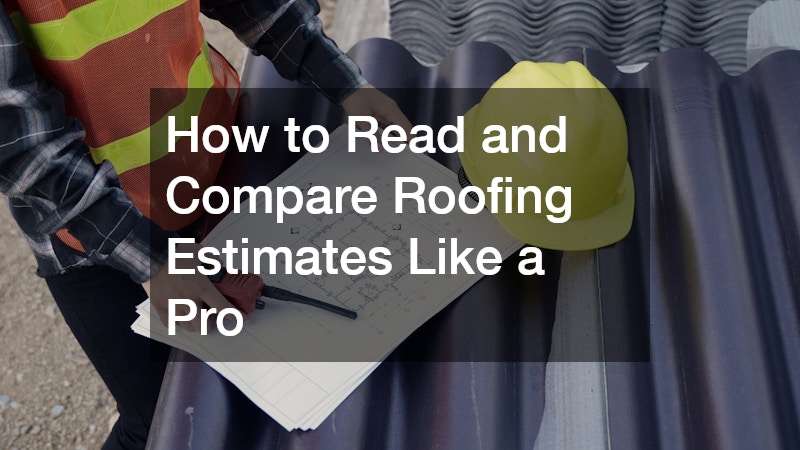- Always get written, detailed estimates from certified roofing companies.
- Compare quotes by looking at materials, labor, warranties, and the scope of work.
- Don’t choose based on price alone—focus on value and contractor credibility.
- Verify licensing, insurance, and certifications before hiring any roofer.
- Watch for red flags like vague pricing, high-pressure tactics, or large upfront payments.
- Ask clear questions to understand timelines, materials, and cleanup responsibilities.

When it’s time to replace or repair your roof, you’re not just paying for shingles—you’re investing in your home’s safety, value, and long-term durability. But before any work begins, one of the most important steps is gathering and comparing roofing estimates. This process can feel overwhelming, especially if you’re unsure what each line item means or how to identify which contractor offers real value. Whether you’re planning a complete roof replacement or a minor repair, learning how to read and compare roofing estimates can save you money, time, and stress.
This article walks you through the entire process, from what should be included in a detailed estimate to tips for comparing quotes from a certified roofing company that offers estimates. We’ll also highlight red flags to avoid roofing scams and explain why certification truly matters.
- Why Roofing Estimates Are Essential for Homeowners
- What’s Included in a Roofing Estimate? A Breakdown for Homeowners
- How to Compare Estimates from Multiple Roofing Contractors
- Certified Contractors vs. Unlicensed Roofers: What’s the Real Difference?
- Avoiding Roofing Scams: Why Professional Estimates Matter
- Questions to Ask Before Accepting a Roofing Estimate
- Final Tips: Getting the Most from Your Roofing Investment
- Conclusion
Why Roofing Estimates Are Essential for Homeowners
A roofing estimate is more than just a price quote—it’s a written snapshot of what a roofing company plans to deliver. A well-structured estimate helps you:
- Understand the scope of the project
- Anticipate all costs, including labor and materials
- Spot unnecessary upcharges or missing details
- Protect yourself with a clear record of expectations
When you work with a certified roofing company that offers estimates, you’re more likely to receive an itemized, accurate, and legally compliant proposal. Certified contractors typically follow industry standards and local codes, which reduces the risk of costly issues down the line.
What’s Included in a Roofing Estimate? A Breakdown for Homeowners
Before comparing quotes, it’s important to understand what should be included in each estimate. A professional roofing estimate from a certified roofing company should contain the following components:
1. Company Information
- Full legal name and business address
- Contractor’s license number
- Proof of insurance and bonding
- Contact details (phone and email)
This information assures you that the company is legitimate and operating within legal and regulatory standards.
2. Detailed Scope of Work
This section outlines exactly what the roofer plans to do. Look for:
- Removal of old roofing: Will they remove all existing layers or just patch over them?
- Installation plan: Details on underlayment, flashing, vents, ridge caps, and drip edge installation
- Decking repair: Mention of replacing rotted wood or sheathing if needed
- Ventilation upgrades: Includes adding ridge vents or improving airflow to extend roof life
A certified roofing company that offers estimates should provide a comprehensive explanation of the entire process, from tear-off to clean-up.
3. Materials List
A good estimate will specify the type, quality, and quantity of materials. Look for details like:
- Type and weight of shingles
- Underlayment (felt or synthetic)
- Flashing and sealants
- Nails and fasteners
- Ice and water shields (especially in colder climates)
Even within the same roofing material type, prices and durability can vary significantly. If the material section is vague, request clarification.
4. Labor and Installation Costs
This section will outline the labor charges. Factors affecting labor costs include:
- Roof complexity (steep slopes, multiple valleys, chimneys)
- Time of year (off-season jobs may be cheaper)
- Crew size and duration of work
Estimates from reputable contractors will clearly outline these costs and explain how they arrived at their numbers.
5. Warranty Information
Every roofing job should come with warranties. You should see:
- Manufacturer’s warranty: Covers defects in roofing materials
- Workmanship warranty: Covers issues from poor installation
Ask for copies of the warranties before signing anything. A certified roofing company that offers estimates will be transparent about coverage limits and claim procedures.
6. Project Timeline
Your estimate should include:
- Proposed start date
- Estimated completion date
- Daily working hours
- Weather delay policies
This timeline helps you plan your schedule and gives a benchmark to hold the contractor accountable.
7. Cleanup and Disposal
A quality contractor includes cleanup and debris disposal in the quote. Look for:
- Dumpster placement and removal
- Nail sweeping
- Protection for landscaping and driveways
Cleanup should never be treated as an afterthought or an extra cost added later.
8. Permits and Inspections
Reputable roofing companies handle the permitting process. Your estimate should mention:
- Local permit requirements
- Inspection schedules
- Who pays for the permits
This ensures the work is done legally and up to code.
9. Payment Terms and Final Price
Estimates should clearly outline:
- Total cost of the project
- Payment structure (e.g., 30% upfront, 70% after completion)
- Accepted payment methods
- Any potential add-on costs
Avoid contractors who demand full payment upfront. A certified roofing company that offers estimates will typically follow industry-accepted payment stages.
How to Compare Estimates from Multiple Roofing Contractors
Once you’ve gathered estimates from several companies, it’s time to compare. Don’t be tempted to just choose the lowest price—focus on value, experience, and clarity.
Key Comparison Factors:
- Consistency in materials: Are all contractors quoting the same materials? If not, compare performance and warranty.
- Scope of work: Does one quote include replacing flashing while another doesn’t?
- Cleanup and extras: Are all estimates including cleanup, disposal, and permits?
- Timeline: How long will each job take, and are the start dates reasonable?
- Warranties: Are the workmanship and material warranties comparable?
Red Flags in Roofing Estimates:
- Extremely low bids—this may mean cutting corners or using subpar materials
- Vague terms like “as needed” without explanations
- Missing license or insurance information
- No mention of warranty coverage
- No itemization of labor or materials
When in doubt, follow up and ask questions. A certified roofing company that offers estimates will gladly walk you through each part of their quote to ensure you’re comfortable.
Certified Contractors vs. Unlicensed Roofers: What’s the Real Difference?

Certification is not just a title—it’s a commitment to quality, safety, and professionalism.
Why Hire a Certified Roofing Company That Offers Estimates?
- Trained to industry standards: Certified roofers often complete formal training and ongoing education.
- Better warranty access: Manufacturers offer extended warranties only through certified contractors.
- Code compliance: Certified contractors are more likely to follow local regulations and building codes.
- Insurance and liability: You’re better protected if something goes wrong during the job.
Hiring an unlicensed or uncertified roofer may save money upfront, but it can cost much more in repairs, legal problems, or even voided warranties later.
Avoiding Roofing Scams: Why Professional Estimates Matter
Sadly, roofing scams are common, especially after major storms or in competitive markets. Getting a detailed estimate from a certified roofing company is your first line of defense.
Common Roofing Scams:
- Storm chasers: Out-of-town crews that disappear after the job
- High-pressure sales: Forcing you to sign on the spot
- Large upfront payments: Then disappearing without doing the work
- Unclear estimates: No breakdown of labor, materials, or warranty
How to Protect Yourself:
- Verify the roofer’s license and insurance
- Request local references and read online reviews
- Ask for a written, signed estimate
- Never pay in full before work begins
- Get copies of all warranties and permits
A certified roofing company that offers estimates will never rush you into a contract or skip proper documentation.
Questions to Ask Before Accepting a Roofing Estimate
Before signing anything, ask these important questions to ensure you’re making the right decision:
- What materials are being used, and why were they chosen?
- Will the crew be subcontractors or employees of the company?
- Are you licensed and insured in this area?
- How do you handle weather delays or unforeseen issues?
- Can I review a sample warranty?
- What is the cleanup process after completion?
- Will there be a final inspection, and who handles it?
These questions can uncover red flags and help you gauge the contractor’s transparency and professionalism.
Final Tips: Getting the Most from Your Roofing Investment
- Schedule estimates during the off-season: You may get better pricing and faster turnaround.
- Request everything in writing: Verbal agreements should be documented in the final contract.
- Be wary of “one-size-fits-all” quotes: Your home is unique and deserves a custom approach.
- Build a relationship: A trustworthy roofing company can be a long-term partner for inspections, maintenance, and storm repairs.
- Stay informed: The more you understand about roofing estimates, the more confident you’ll be in your decisions.
Conclusion
Hiring the right contractor starts with reading and comparing roofing estimates the smart way. Don’t be lured in by the lowest number on the page—instead, look for transparency, detailed itemization, professional conduct, and proper certification. Working with a certified roofing company that offers estimates not only ensures quality workmanship but also gives you peace of mind that your roof—and your home—are in good hands.
By understanding what’s included in each estimate and learning how to ask the right questions, you can confidently make one of the most important decisions in home improvement. Your roof protects everything beneath it—make sure the team building it is just as reliable.






